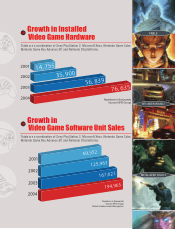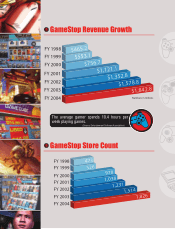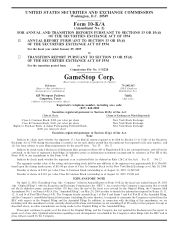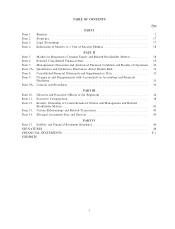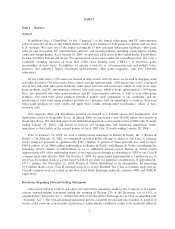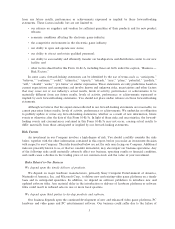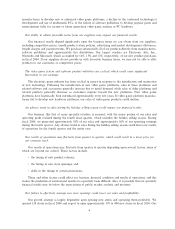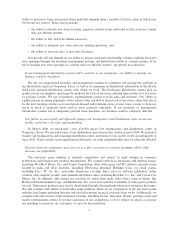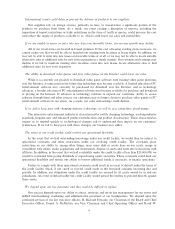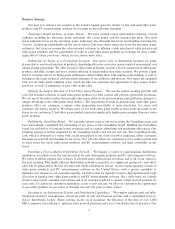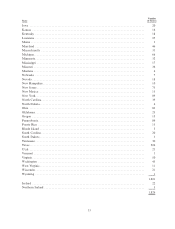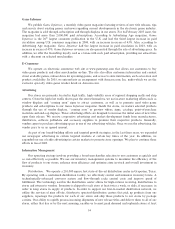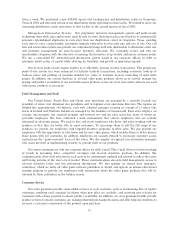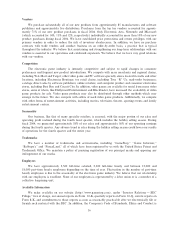GameStop 2004 Annual Report Download - page 13
Download and view the complete annual report
Please find page 13 of the 2004 GameStop annual report below. You can navigate through the pages in the report by either clicking on the pages listed below, or by using the keyword search tool below to find specific information within the annual report.International events could delay or prevent the delivery of products to our suppliers.
Our suppliers rely on foreign sources, primarily in Asia, to manufacture a signiÑcant portion of the
products we purchase from them. As a result, any event causing a disruption of imports, including the
imposition of import restrictions or trade restrictions in the form of tariÅs or quotas, could increase the cost
and reduce the supply of products available to us, which could lower our sales and proÑtability.
If we are unable to renew or enter into new leases on favorable terms, our revenue growth may decline.
All of our retail stores are located in leased premises. If the cost of leasing existing stores increases, we
cannot assure you that we will be able to maintain our existing store locations as leases expire. In addition, we
may not be able to enter into new leases on favorable terms or at all, or we may not be able to locate suitable
alternative sites or additional sites for new store expansion in a timely manner. Our revenues and earnings may
decline if we fail to maintain existing store locations, enter into new leases, locate alternative sites or Ñnd
additional sites for new store expansion.
The ability to download video games and play video games on the Internet could lower our sales.
While it is currently not possible to download video game software onto existing video game platforms
over the Internet, at some point in the future this technology may become available. A limited selection of PC
entertainment software may currently be purchased for download over the Internet, and as technology
advances, a broader selection of PC entertainment software may become available for purchase and download
or playing on the Internet. If advances in technology continue to expand our customers' ability to access
software through these and other sources, our customers may no longer choose to purchase video games or PC
entertainment software in our stores. As a result, our sales and earnings could decline.
If we fail to keep pace with changing industry technology, we will be at a competitive disadvantage.
The interactive entertainment industry is characterized by swiftly changing technology, evolving industry
standards, frequent new and enhanced product introductions and product obsolescence. These characteristics
require us to respond quickly to technological changes and to understand their impact on our customers'
preferences. If we fail to keep pace with these changes, our business may suÅer.
The terms of our credit facility could restrict our operational Öexibility.
In the event that we had outstanding borrowings under our credit facility, we would then be subject to
operational covenants and other restrictions under our revolving credit facility. The covenants place
restrictions on our ability to, among other things, incur more debt or create liens on our assets, merge or
consolidate with others, make acquisitions and investments, dispose of assets and enter into transactions with
aÇliates. In addition, in the event that we had availability under the credit facility of less than $20,000,000, we
would be restricted from paying dividends or repurchasing equity securities. These covenants could limit our
operational Öexibility and restrict our ability to borrow additional funds, if necessary, to Ñnance operations.
Failure to comply with these operational covenants could result in an event of default under the terms of
the credit facility which, if not cured or waived, could result in the borrowed amounts becoming due and
payable. In addition, our obligations under the credit facility are secured by all assets owned by us and our
subsidiaries. An event of default under the credit facility would permit the lenders to proceed directly against
those assets.
We depend upon our key personnel and they would be diÇcult to replace.
Our success depends upon our ability to attract, motivate and retain key management for our stores and
skilled merchandising, marketing and administrative personnel at our headquarters. We depend upon the
continued services of our key executive oÇcers, R. Richard Fontaine, our Chairman of the Board and Chief
Executive OÇcer, Daniel A. DeMatteo, our Vice Chairman and Chief Operating OÇcer and David W.
6




